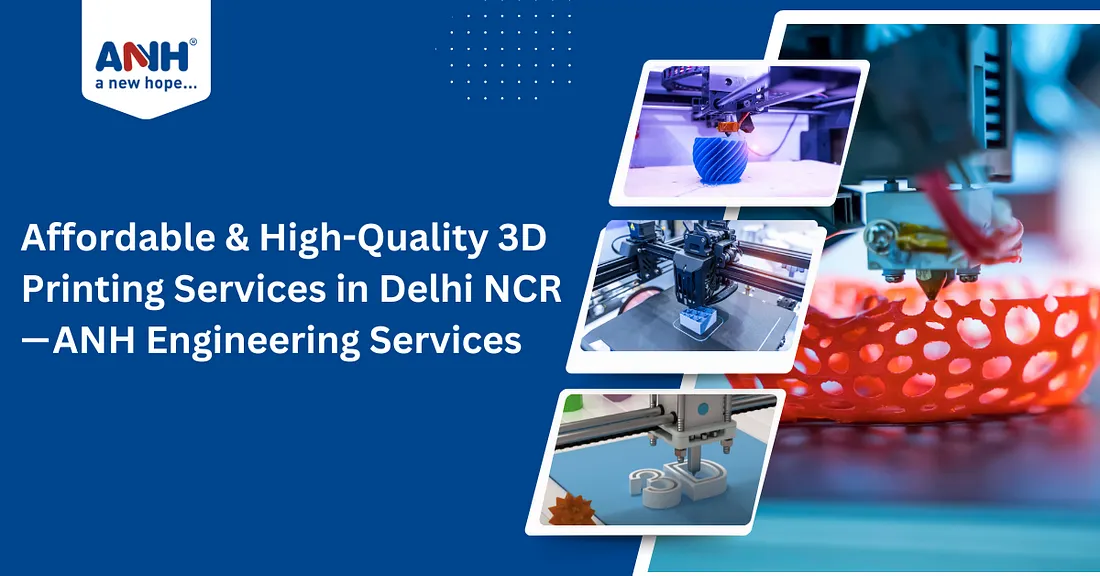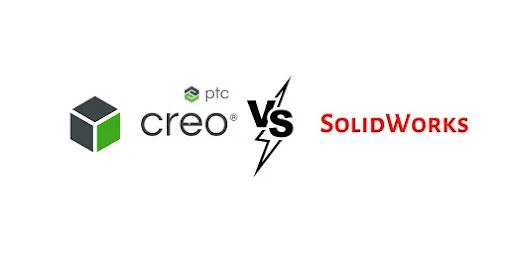Affordable & High-Quality 3D Printing Services in Delhi NCR — ANH Engineering Services
Looking for professional 3D printing services in Delhi NCR? ANH offers competitive prices for rapid prototyping, custom prints, and wide material options.
Why Choose ANH for 3D Printing in Delhi NCR?
ANH combines advanced 3D printing technologies with expert support, serving startups, enterprises, and individuals across Delhi & NCR.
Our Key Benefits:
- Quick Turnaround Time
- High-Quality Prints with micron-level accuracy
- Wide Material Options for various applications
- Prototyping to Production under one roof
- Custom Design Assistance for clients without a 3D model
3D Printing Technologies
FDM (Fused Deposition Modeling)
- How it works: Melts plastic filament and deposits it layer-by-layer.
- Materials: PLA, ABS, PETG, TPU, Nylon.
- Applications: Rapid prototyping, functional parts, consumer goods.
- Pros: Affordable, widely accessible.
- Cons: Visible layer lines, lower resolution.
🔹 SLA (Stereolithography)
- How it works: Uses a UV laser to cure liquid resin layer-by-layer.
- Materials: Photopolymer resins (standard, tough, dental, etc.)
- Applications: High-detail prototypes, dental models, jewelry.
- Pros: High precision and smooth surface.
- Cons: Brittle, requires post-curing.
🔹 SLS (Selective Laser Sintering)
- How it works: Fuses powdered plastic (like Nylon) with a laser.
- Materials: Nylon, TPU, composite powders.
- Applications: Industrial parts, functional prototypes, enclosures.
- Pros: No support needed, strong and complex geometries.
- Cons: Higher cost, rougher surface finish.
MJF (Multi Jet Fusion)
- How it works: Applies a binding agent and heat to fuse nylon powder.
- Materials: Nylon 12, Nylon 11, TPU.
- Applications: High-volume production, functional parts, hinges, connectors.
- Pros: Faster than SLS, better detail and strength.
- Cons: Limited material choices compared to FDM.
Vacuum Casting (Not a 3D printing method but used with it)
- How it works: A master model (often 3D printed) is used to create a silicone mold, which is filled with resin under vacuum.
- Materials: Polyurethane resins that mimic ABS, rubber, or PP.
- Applications: Short-run production, prototypes for functional testing.
- Pros: Excellent surface finish, variety of materials.
- Cons: Requires master model, mold wears out after limited uses.
Materials We Offer
We support a wide range of 3D printing materials, each suited to different industries and purposes. Below is a detailed breakdown of what each material type offers:
Plastics
PLA (Polylactic Acid)
- Properties: Biodegradable, easy to print, low warping.
- Uses: Prototypes, display models, educational tools.
- Pros: Eco-friendly, affordable, low temperature requirement.
- Cons: Brittle and not ideal for high-stress parts.
ABS (Acrylonitrile Butadiene Styrene)
- Properties: Tough, impact-resistant, durable.
- Uses: Functional parts, enclosures, automotive components.
- Pros: Stronger than PLA, better heat resistance.
- Cons: Prone to warping, needs a heated bed.
PETG (Polyethylene Terephthalate Glycol)
- Properties: Durable, slightly flexible, food-safe.
- Uses: Mechanical parts, containers, wearable devices.
- Pros: Combines the strength of ABS with the ease of PLA.
- Cons: Slight stringing, less rigid than PLA.
Nylon
- Properties: High strength, abrasion-resistant, semi-flexible.
- Uses: Gears, hinges, industrial tools, functional parts.
- Pros: Durable and low-friction.
- Cons: Absorbs moisture, needs dry storage.
TPU (Thermoplastic Polyurethane)
- Properties: Rubber-like flexibility, elastic.
- Uses: Phone cases, seals, gaskets, footwear.
- Pros: Flexible and impact-resistant.
- Cons: Slower print speeds, trickier to handle.
Resins (Used in SLA/DLP printers)
Standard Resin
- Properties: Smooth surface finish, fine detail.
- Uses: Prototypes, display models, figurines.
- Pros: High precision, clean look.
- Cons: Brittle, not suitable for functional use.
Tough Resin
- Properties: Stronger, impact-resistant.
- Uses: Functional prototypes, snap-fit parts.
- Pros: Closer to ABS in strength.
- Cons: Still not as durable as thermoplastics.
Flexible Resin
- Properties: Rubber-like elasticity, soft touch.
- Uses: Wearables, seals, soft-touch buttons.
- Pros: Great for simulating rubber.
- Cons: Can degrade faster over time.
Dental-Grade Resin
- Properties: Biocompatible, medically safe.
- Uses: Dental molds, surgical guides.
- Pros: Certified for medical applications.
- Cons: Expensive, requires strict handling.
Metals (Available on Request for Specialized Projects)
Stainless Steel
- Properties: Corrosion-resistant, strong.
- Uses: Industrial parts, tools, jewelry.
- Pros: High durability and longevity.
- Cons: High cost and longer processing time.
Titanium
- Properties: Lightweight, corrosion-resistant, bio-compatible.
- Uses: Aerospace, medical implants.
- Pros: Strong-to-weight ratio, safe for the body.
- Cons: Very expensive.
Aluminum
- Properties: Lightweight, thermally conductive.
- Uses: Automotive, aerospace, robotics.
- Pros: Lightweight with good strength.
- Cons: May lack fine detail in complex prints.
Composites
Carbon Fiber Reinforced PLA/ABS
- Properties: Extremely stiff and strong, lightweight.
- Uses: Drones, robotics, sports equipment.
- Pros: High strength-to-weight ratio.
- Cons: Can be abrasive to printer nozzles.
Glass Fiber Reinforced Filaments
- Properties: Tough, strong, slightly flexible.
- Uses: Automotive, functional engineering parts.
- Pros: Good dimensional stability.
- Cons: Heavier than carbon fiber.
Wood-Filled PLA
- Properties: Contains actual wood fibers, gives a wood-like finish.
- Uses: Decorative items, prototypes, artistic models.
- Pros: Aesthetic appeal, easy to sand or paint.
- Cons: Brittle, limited structural use
- Industries We Serve
- Architecture & Construction
- Engineering & Manufacturing
- Healthcare & Dentistry
- Education & Research
Need a Prototype or Custom Part?
Whether you need rapid prototyping, functional parts, or custom miniatures, ANH’s expert team ensures your vision becomes a physical reality with unmatched accuracy and detail.
Serving All Areas in Delhi NCR
📞 Contact ANH Today for 3D Printing Services in Delhi NCR


Comments
Post a Comment